What do company owners think about syndication in venture? This phenomenon looks complicated, but financial scientists started to research it a long time ago. In their attempts provided all over European and American universities, specialists try to discover and test hypotheses about the underlying reasons for the fund's cooperation into syndicates. These attempts were successful, as they managed to identify top-3 reasons for syndicate forming: risk sharing, portfolio diversification, and the option to access larger deals.
But there are still a lot of in-depth insights. For example, researchers got evidence that a lower level of experience and expertise fosters the need to syndicate an investment, so the VC-funds join syndicates for the syndicate partners' selection and value-adding skills. Thus, Unicorn Nest decided to get more data by starting to analyze syndicates. This research aimed to increase understanding of the venture capital market based on a comprehensive and verified dataset of deals, startups and funds collected by UN by using ML-Powered Scraping Spiders. Work algorithm was simple:
- To identify syndicates based only on round data
- Study the found syndicates, analyze and identify common features
- Analyze the individual features of each syndicate separately
Looks already impressive, but wait to check the results!
How to find syndicates?
To find and arrange syndicates, UN specialist gathered data from:
- 234,120 investments made from 1975 to 2020;
- 117952 startups;
- 41,341 funds.
A Louvain method for community detection was used – it is an algorithm for detecting communities in networks. It maximizes a modularity score for each community, where the modularity quantifies the quality of an assignment of nodes to communities. It helps build Adjacency Matrix heat map (see below), so the syndication process can have clear visualization.
13 major syndicates: who are they and what got in common?
Thanks to the Louvain method and data analysis, UN specialists were able to identify 13 venture syndicates working together regularly. Generally, they are:
1) American syndicate of 2381 funds consisting of equal shares of funds and Ultra-high-net-worth individuals (UHNWI) investing in American startups at the seed stage with a round size of up to $ 20 million.
2) Israel-American syndicate of 513 funds investing in American and Israeli startups at the seed stage with a round size of up to $ 20 million.
3) Spanish American Syndicate of 392 funds investing in Spanish and American startups at seed and early stage with round size up to $ 10 million.
4) Chinese syndicate of 765 funds investing in Chinese startups at the early stage with a round size of up to $ 40 million.
5) American syndicate of 1781 funds investing in American startups at early and late stage with round size up to $ 30 million.
6) American syndicate of 1116 funds investing in American startups at the early and seed stage with a round size of up to $ 10 million.
7) European syndicate of 1551 funds investing in European and American startups at seed and early stage with round size up to $ 10 million.
8) A Japanese-American syndicate of 708 funds investing in American and Japanese startups at the eуarly and seed stage with a round size up to $ 15 million.
9) Indian American syndicate of 500 funds investing in Indian and American startups at seed and early stage with round size up to $ 8 million.
10) A Canadian-American syndicate of 430 funds investing in Canadian and American startups at the early and seed stage with a round size up to $ 20 million.
11) An international syndicate of 212 funds focused on Blockchain and Cryptocurrency investing in US startups at the early and seed stage with a round size of up to $ 20 million.
12) An American syndicate of 1252 funds focused on Medical and Health Care, investing in US startups at the early and late stage with a round size of up to $ 40 million.
13) A French syndicate of 432 funds investing in French startups at the early and seed stage with a round size up to $ 15 million.
To understand industries syndicates prefer to invest in, firstly the 'Software', 'Internet', 'Information Technology' and 'E-Commerce' categories were excluded as they are typical for internet technologies and already are in the top industries of the majority of funds.
Secondly, the most popular industry to discover was health care – it reached a top-3 position among 11 syndicates. SaaS is in the top of all 13 syndicates and reached the top-3 of industries in 7 syndicates.
Artificial intelligence and machine learning are at the top of all syndicates, except 12 and 5, while biotechnology got to the top of 10 syndicates (exceptions are for syndicates 1, 9, 11). The last popular industries are financial services (among the top of 9 syndicates) and mobile (in the top for 11 syndicates, excluding syndicates 11 and 12).
Most syndicates invest in the early stage (9 out of 13); others prefer the seed stage. For most syndicates, the average round is up to $ 10 million; only in two syndicates average round ranges from $ 10 to $ 20 million. In two more syndicates, the average round size was almost up to $ 40 million. Also, each syndicate featured funds with an average round of more than $ 100 million.
Speaking about geography of founders, funds from the US are present in every syndicate, but in various proportions; China, the United Kingdom, Germany and Singapore are also present in several syndicates at the same time. There is a separate syndicate of Israel and United States foundations, with about 50% of the foundations being Israel, 40% from the United States, and the remaining 10% from other countries.
Meanwhile, Spain, Japan, India, Canada, France have their own syndicates almost closed to other countries. Syndicates from China, India and France can be called isolated as they mostly invest in home-based startups.
According to the received data, it can be defined that all syndicates invest in the United States in varying proportions. Moreover, 5 out of 13 syndicates invest only in US-based startups. There are several syndicates that are focused on startups from Israel, Spain, the United Kingdom, Germany, Japan and Canada in addition to US-based.
Syndicate deep research: what’s inside
Let's check all 13 syndicates more intently – for this purpose UN provided a detailed analysis of each syndicate. As there is a list of industries mentioned in the syndicate similarity section above, additional spheres would be described for all syndicates.
The first one is American syndicate including 2381 funds with 43890 number of deals. This syndicate equally consists of funds and Ultra-high-net-worth individuals (UHNWI) with investments in American startups on seed stage with round size up to $ 20 million.

Here are top-10 funds by the strength of syndicated connections:
- SV Angel
- Y Combinator
- 500 Startups
- GV
- Andreessen Horowitz
- First Round Capital
- Lerer Hippeau
- Techstars
- BoxGroup
- Paul Buchheit
The top includes for this syndicate are social media, apps, education, advertising, fintech, food and beverage and big data. Analysis of the industries shows that the syndicate is focused on cutting edge technologies and rapidly developed industries.
About 90% of this syndicate funds are based in the US with the following state structure: 55% of funds are based in California, 20% in New York and other 25% are spread between Massachusetts, Washington and Texas.
This is the only syndicate with 46% of Ultra-high-net-worth individuals and 44% of VC-funds. Corporate investors are only 8% of the total amount. 99% of these funds invest in startups from the US, focusing on the seed stage. However, 50% of funds also invests in early stage and 10% on late stage as funds get an opportunity to choose several prior investment stages.
About 70% of the funds in this syndicate participate in rounds up to $ 10 million, for 20% of funds the average round ranges from $ 10 to $ 20 million. Major of these funds were established in 2010-2017 and more than 50% of them invest in startups aged up to 2.5 years.35% of funds prefer 2,5-5 year startups and 15% focus on startups from 5 to 12 years.
The second one is an Israeli-American group of 513 funds investing in American and Israeli startups at the seed stage with a round size of up to $ 20 million. The syndicate is investing in popular and emerging information technology-oriented industries and technologies focusing on information security.

Top-10 funds by the strength of syndicated connections:
- Pitango Venture Capital
- Vertex Ventures Israel
- Vertex Ventures
- OurCrowd
- Viola ventures
- iAngels
- Jerusalem Venture Partners (JVP)
- Zeev Ventures
- Evergreen Venture Partners
- Gemini Israel Ventures
Half of this syndicate are Israel funds, 40% belongs to the US and the other 10% is divided between various countries. 70% of it are VC-funds, then 20% goes to corporate investors and 10% are Ultra-high-net-worth individuals (UHNWI).
Investment geofocus is also divided between the USA and Israel - 55% goes to the US, 30% to Israel and the other 15% consists of the UK, Brazil. Romania, Russia and other countries. This syndicate mostly invests in early stage, but 80% of funds also do seed stage and 60% goes to late stage.
About 50% of the funds in this syndicate participate in rounds up to $ 10 million, for 25% of funds the average round ranges from $ 10 to $ 20 million and 10% of funds go from $ 20 to $ 30 million. Mostly this syndicate invests in startups aged 2.5 to 5 years.
The third syndicate is a small Spanish-American syndicate with 392 funds and 1592 number of deals focused on web and mobile technologies, medicine, education and retail.

Here are top-10 funds by the strength of syndicated connections:
- Wamda Capital
- Cabiedes & Partners
- Julio Vasconcellos
- Caixa Capital Risc
- Florian Hagenbuch
- Bonsai Venture Capital SCR
- François Derbaix
- Marcelo Sampaio
- Mate Pencz
- Media Digital Ventures
Top industries for this syndicate are: education, apps, marketplace, social media, fintech, retail, food and beverage, travel and advertising.
45% of these syndicate funds are based in Spain, 25% are from the USA, and 30% come from Italy, Brazil, and Mexico. Investments are also divided between Spain (35%), US (20%) and same Italy, Brazil and Mexico (15% per each). Almost 65% of this syndicate are VC-funds, corporate investors got part of 20% and UHNWI are no more than 13%. This syndicate is focused on seed and early stage - only 20% of funds participate in late stage; they also got an average round up to $10 million and invest in startups aged 0 to 5 years.
The fourth is Chinese syndicate including 765 funds with 5300 number of deals. This syndicate invests in Chinese startups at early stage with round size up to $ 40 million.
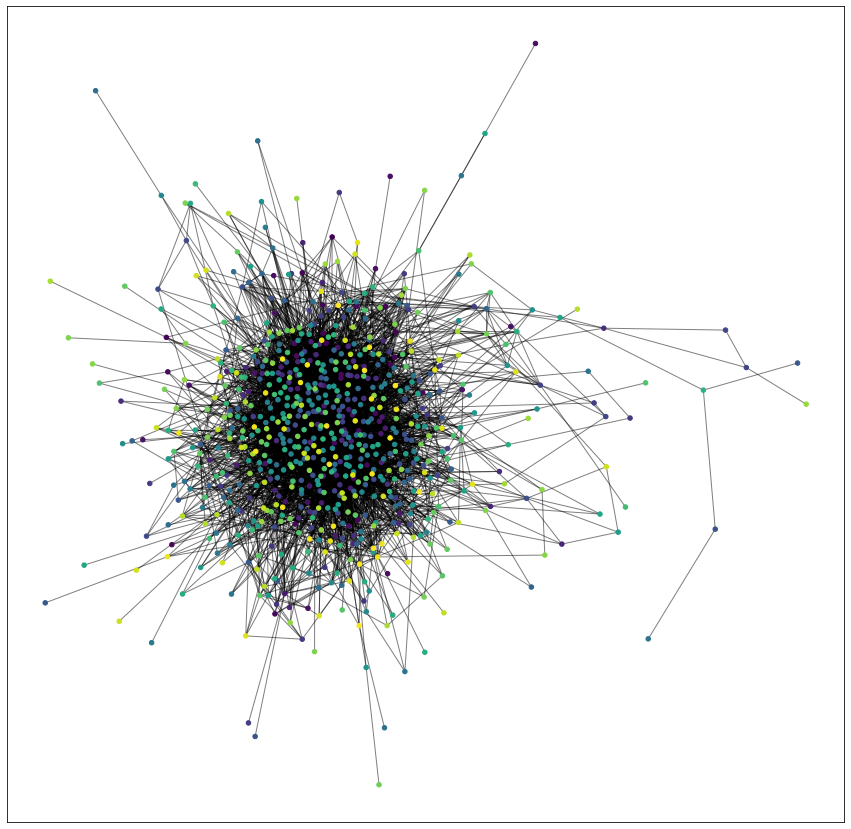
Here are top-10 funds by the strength of syndicated connections:
- Tencent Holdings
- Sequoia Capital China
- IDG Capital
- Matrix Partners China
- Qiming Venture Partners
- Hillhouse Capital Group
- ZhenFund
- Legend Capital
- Shunwei Capital
- GGV Capital
In addition to the industries mentioned in the syndicate similarity section, the top-10 includes robotics, medical, enterprise, pharmaceutical, manufacturing, transportation, food and beverage, and medical devices.
Analysis of this syndicate invested industries shows that the syndicate is focused on the medical, enterprise, manufacturing and robotics areas.
About 80% of this syndicate funds are based in China, funds from the United States account for about 13%, the remaining 7% are from the United Kingdom, Singapore and France. Most of the funds are located in Chinese cities Beijing and Shanghai.
73% of these syndicate VC-funds are venture capital funds, about 24% are corporate investors, and 3% goes to accelerator and UHNWI. These funds invest in startups from China - 80%, followed by the United States - 18%. Investment stages are seed stage, 50% belong to the late stage, and about 40% of funds participate in the early stage.
About 21% of the funds in this syndicate participate in rounds up to $ 10 million, for 17% of funds the average round ranges from $ 10 to $ 20 million and 10% of funds got from $ 20 to $ 30 million, 32% of funds got from $ 30 to $ 100 million and 20% got more than $ 100 million. Mostly this syndicate invests in startups aged 2.5 to 5 years.
Number five is a big American syndicate including 1781 funds with 17671 number of deals. It invests in American startups at the early and late stage with a round size of up to $ 30 million.
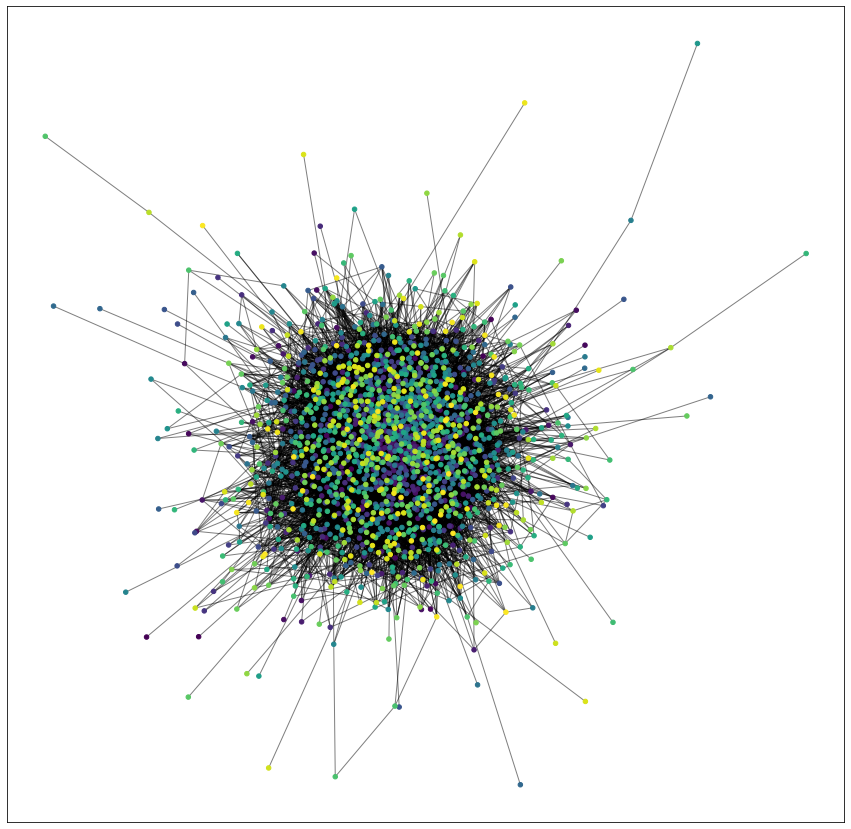
Here are top-10 funds by the strength of syndicated connections:
- Intel Capital
- Goldman Sachs
- Kleiner Perkins
- Accel
- Sequoia Capital
- DFJ
- Bessemer Venture Partners
- Oak Investment Partners
- Austin Ventures
- J & W Seligman
This syndicate invests in semiconductor, telecommunications, wireless, security, advertising, marketing, energy and service industry. The top 3 for this syndicate are: enterprise software, health care and manufacturing.
Around 80% of the funds of this syndicate are based in the US with the following state structure: 30% based in California, 15% in New York, 8% are from Massachusetts, 5% from Texas and less than 5% are from Washington, Illinois, Connecticut, Maryland, Pennsylvania and Georgia. All of them invest in American startups at an early and late stage, approximately 30% of funds also invest as private equity and 30% do the seed stage.
78% of funds are VC, 22% are corporate investors and 5% are Ultra-high-net-worth individuals (UHNWI).
This syndicate invests differently in terms of a round size: 20% participate in rounds up to $10 million, 35% of funds prefer range from $10 to $20 million, another 20% participate in rounds from $20 to $ 30 million and last 10% invests in rounds up to $40 million. This syndicate also chose startups aged from 2,5 to 7 years.
Syndicate №6 is another American syndicate including 1116 funds with 5613 number of deals. It invests in American startups at the early and seed stage with a round size of up to $ 10 million and prefers popular and developing industries or technologies focused on IT, biotech and education.
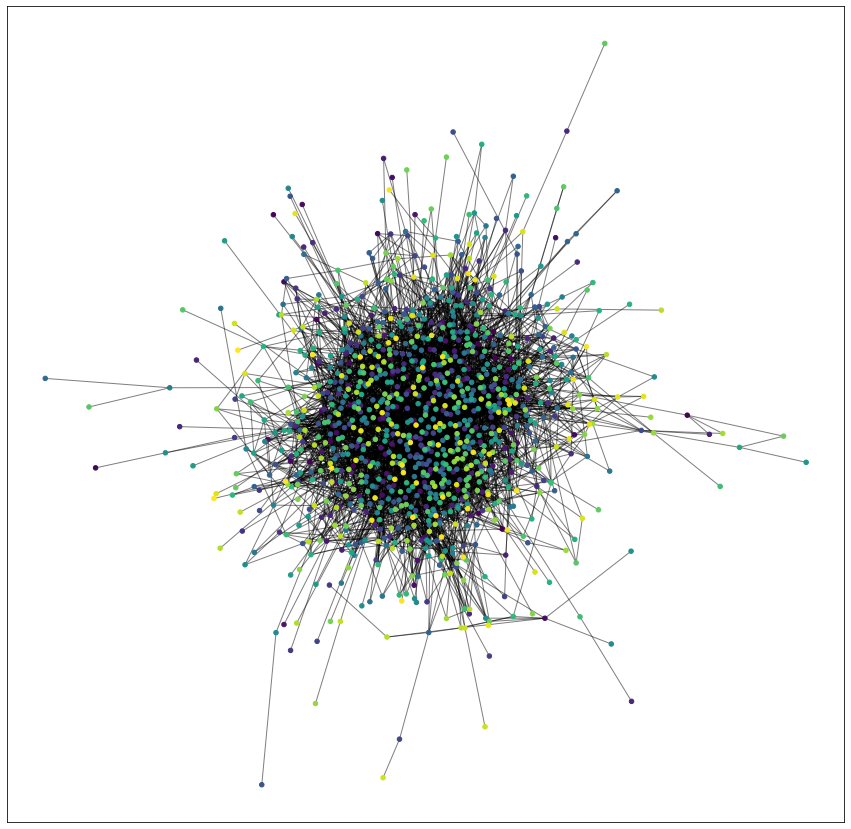
Here are top-10 funds by the strength of syndicated connections:
- Service Provider Capital
- Alumni Ventures Group
- M25
- Rise of the Rest
- Hyde Park Venture Partners
- Total Access Fund
- Tech Coast Angels
- Fission Ventures
- Golden Seeds
- Wakestream Ventures
This syndicate invests in education, medical device, medical, food and beverage, energy, manufacturing and marketing. 90% of finds are US-based, particularly in the following states: 15% based in California, 10% in New York, 8% are from Illinois, 5% from Massachusetts and less than 5% are from Texas, Pennsylvania, Michigan, Washington, Colorado and Ohio. Most of them are focused on American startups at an early and seed stage, only 30% of funds that invest at the late stage.
The main part (over 72%) of funds average round goes to $10 million with startup age from 2,5 to 5 years.
The seventh syndicate is a European syndicate investing in European and American startups on seed and early stage with an average round size up to $10 million. It consists of 1551 funds and got 8768 number of deals.
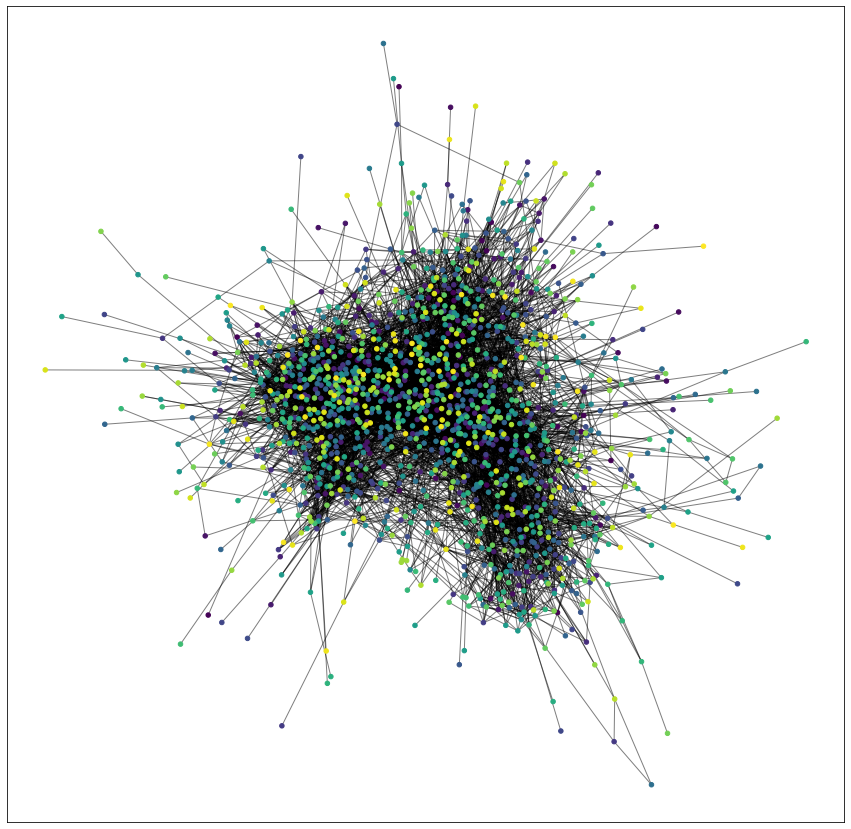
Here are top-10 funds by the strength of syndicated connections:
- High-Tech Gründerfonds
- LocalGlobe
- Seedcamp
- HV Holtzbrinck Ventures
- Global Founders Capital
- Point Nine Capital
- Speedinvest
- btov Partners
- IBB Beteiligungsgesellschaft
- Enterprise Ireland
Top industries for this syndicate are: medical, education, manufacturing, advertising, medical device, food and beverage and pharmaceutical.
30% of these syndicate funds are based in the UK, 20% are from Germany, 10% comes from the US, Sweden and Switzerland got 5% each and the other 35% are divided between Finland, The Netherlands, Denmark, Ireland and Norway. Geofocus of this syndicate is also various: the United Kingdom startups got 40%, the United States and Germany got 20% each and the other 20% are spread between Sweden, Switzerland, Finland, Ireland, Denmark, Austria and The Netherlands.
63% of this syndicate are VC-funds, corporate investors and UHNWI got an equal part of 17% and 3% belongs to accelerator. This syndicate is focused on seed and early stage, but 30% of funds also participate in late stage. Average round size for 77% is up to $10 million and this syndicate invests in startups aged 0 to 5 years.
A Japanese-American syndicate №8 including 708 funds with 4771 number of deals. It invests in American and Japanese startups at the early and seed stage with a round size of up to $ 15 million.
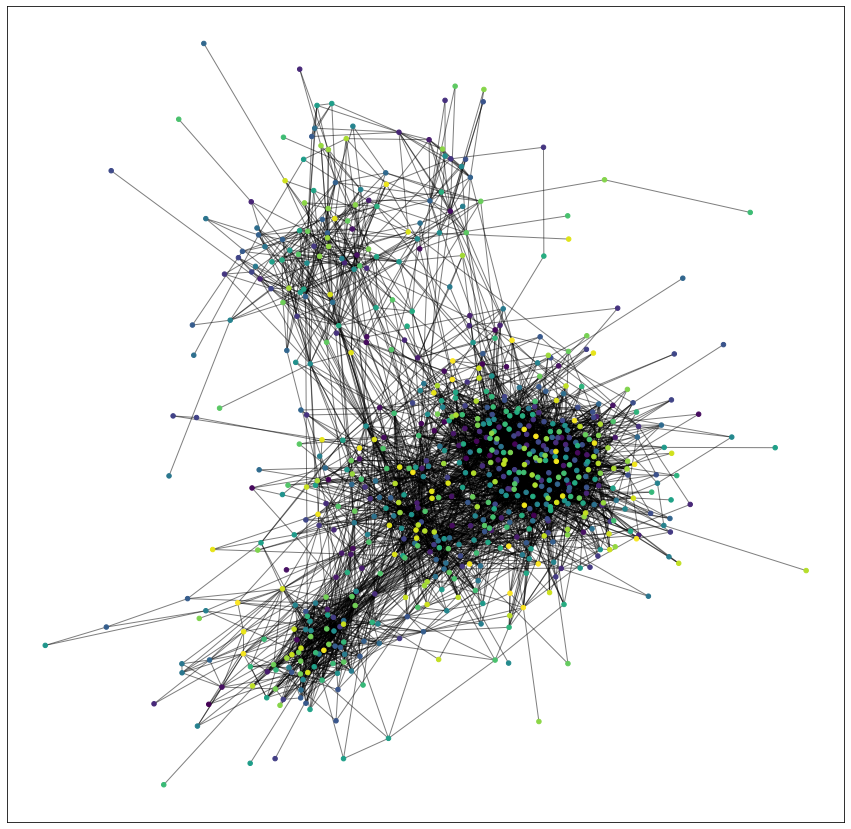
Here are top-10 funds by the strength of syndicated connections:
- SMBC Venture Capital
- Mizuho Capital
- Mitsubishi UFJ Capital
- SBI Investment
- East Ventures
- Global Brain Corporation
- Golden gate ventures
- JAFCO Japan
- Mirae Asset Venture Investment
- Mizuho bank
This syndicate prefers to invest in apps, education, fintech, advertising, marketplace, social media, food and beverage. An analysis of the syndicate's industries shows that its investing spheres are popular and emerging industries and technologies focused on information technology, financial services and health care.
The syndicate consists of 30% of Japan funds, 10% each for Australia, Singapore, South Korea, United States, the remaining 30% are taken by Indonesia, China, New Zealand, the United Kingdom, Malaysia. Syndicate’s geofocus of investments includes 2 major countries: the United States and Japan - 25% each; approximately 10% of investments each goes to Singapore, South Korea and Australia, and the remaining 20% is divided between Indonesia, the United Kingdom, New Zealand, Malaysia and India.
This syndicate invests mostly on the early and seed stage with 40% left for the late stage. For 65% of this syndicate's funds, the average round is up to $ 10 million; rounds from $ 10 to $ 20 million involve 25% of the funds. In terms of startup age this syndicate chose a range between 2 to 6 years.
Syndicate №9 is an Indian-American syndicate focused on both Indian and American startups on seed and early stage with a round size up to $8 million. It includes 500 funds and 2915 deals.
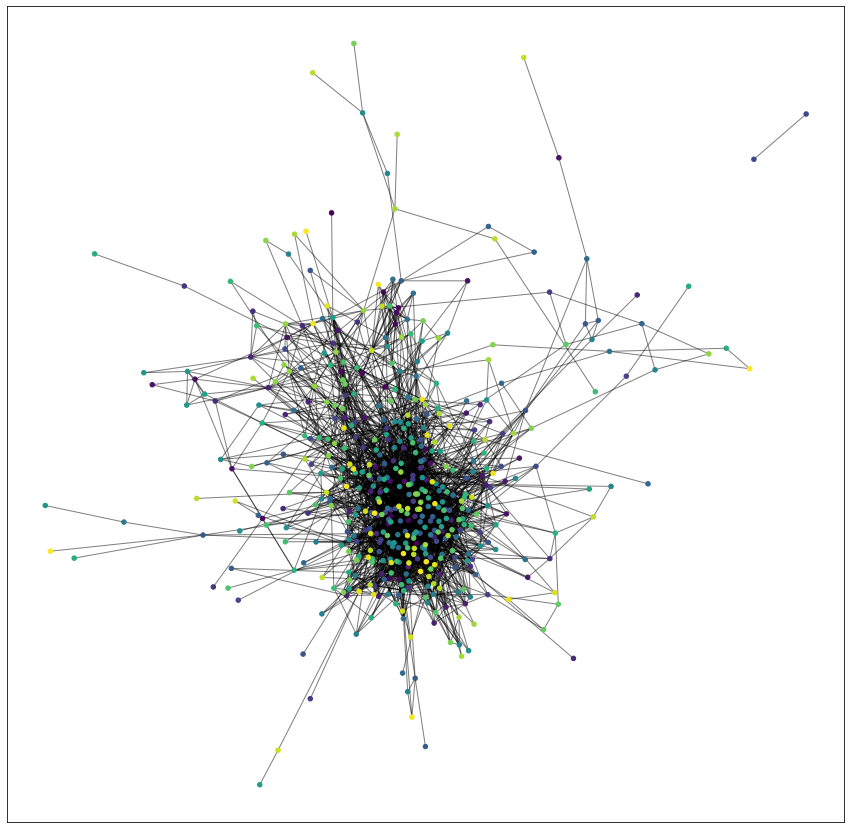
Top-10 funds by the strength of syndicated connections:
- Blume Ventures
- Sequoia Capital India
- Rajan Anandan
- Kunal Shah
- Phanindra Sama
- Anupam Mittal
- Binny Bansal
- LetsVenture
- Chiratae Ventures
- 3one4 Capital
This syndicate's top industries are: health care, financial services and education. After these three, it is focused on food and beverage, finance, fintech, apps, banking, retail, energy and shopping. Unlike other syndicates, this one is more focused on financial services and has no artificial intelligence, enterprise software and biotechnology on a list of top-15 priorities.
50% of this syndicate funds are based in India, 20% are from the US and China, South Africa, Mauritius, France, The Netherlands and Russian Federation got 5% each. Mainly (70%) this syndicate invests in India, the US got 20%, other investments are spreaded between the countries of participants.
55% of this syndicate are VC-funds, corporate investors and UHNWI got an equal part of 20% and 5% belongs to accelerator. This syndicate is focused on the seed stage, but 75% of funds also participate in the early stage and 25% do a late stage. Average round size for 70%, 15% invests from $10 to $20 million per round. This syndicate invests in startups aged 0 to 7 years.
Canadian-American syndicate №10 includes 430 funds and got 2393 deals. It invests to Canadian and American startups at an early and seed stage with an average round size up to $20 million.
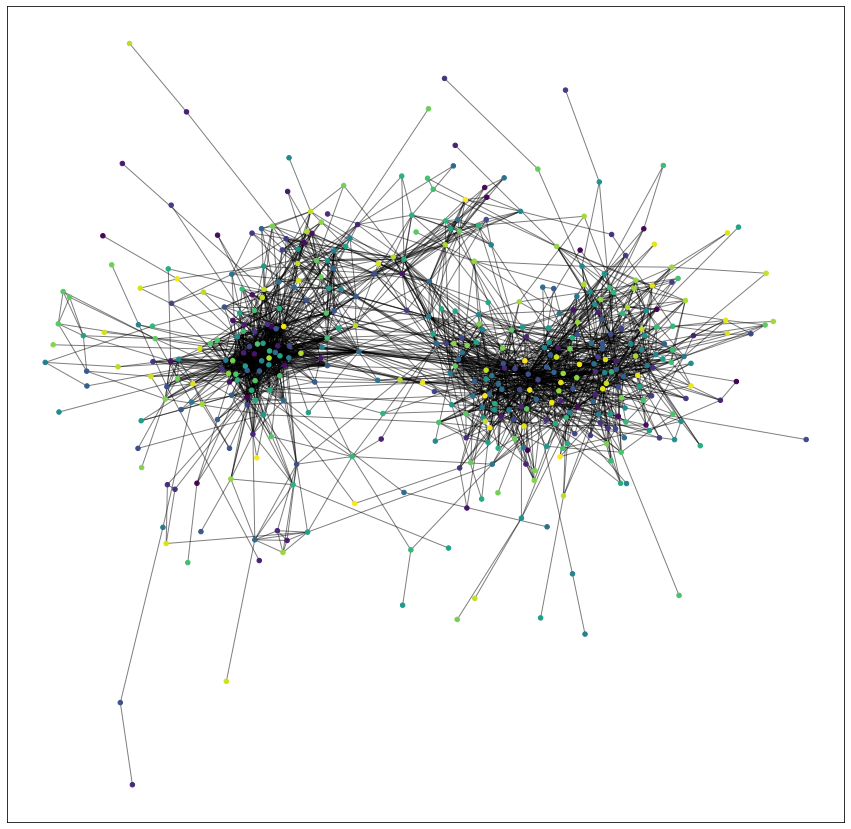
Top-10 funds by the strength of syndicated connections:
- BDC Venture Capital
- Commonwealth Bank of Australia
- iNovia Capital
- MaRS Investment Accelerator Fund
- US Bank
- Real Ventures
- Toronto Dominion Bank Group
- Bank of America Merrill Lynch
- Intesa Sanpaolo
- Neva Finventures
This syndicate top industries are: finance, energy, fintech, pharmaceutical, medical and security. Mostly this syndicate invests in financial services and health care.
45% of these syndicate funds are based in Canada, 30% are from the US, 5% comes from the UK, and the other 20% are funds from Sweden, Italy, The Netherlands, Australia, France, Japan and China. This syndicate mostly invests in startups from Canada (45%) and the US (35%).
60% of this syndicate are VC-funds, corporate investors got 35% and 5% are divided between UHNWI and accelerator. This syndicate mostly invests in early stage rounds, but 65% of the funds invest in the seed stage and 60% of them participate in the late stage.
Around 40% of funds in this syndicate participate in rounds up to $10 million, for 15% of funds the average round ranges from $10 to $ 20 million and 8% of funds participate in rounds with range from $20 to $30 million. This syndicate invests in startups aged 2,5 to 8 years.
International syndicate №11 includes 212 funds with 12711 number of 1419 deals with main focus on blockchain and cryptocurrency. This international syndicate invests in American startups on an early and seed stage with an average round size up to $20 million.

Top-10 funds by the strength of syndicated connections:
- Polychain
- Pantera Capital
- FBG Capital
- Multicoin Capital
- Digital Currency Group
- Coinbase Ventures
- GBIC
- MetaStable Capital
- Arrington XRP Capital
- Fenbushi Capital
This syndicate’s top-3 are blockchain, financial services and cryptocurrency. It also invests in bitcoin, fintech, finance, ethereum, computer, security, payments and cyber security.
55% of finds are US-based, 15% are from China, 10% comes from the UK and Singapore, other 20% are divided between Germany, India, The Netherlands, Australia, Canada and Malta. 90% of funds invests in startups from the US.
65% of this syndicate are VC-funds, corporate investors and UHNWI got an equal parts of 15% and 5% goes to accelerator. This syndicate mostly invests in early and seed stage, but 20% of the funds also participates in a late stage.
Around 45% of funds in this syndicate participate in rounds up to $10 million, for 25% of funds the average round ranges from $10 to $ 20 million and 12% of funds participate in rounds from $20 to $30 million. This syndicate invests in young startups aged 0 to 2,5 years.
An American syndicate №12 includes 1252 funds with 12711 number of deals. It is focused on medical and health care with investments to American startups with an average round size of up to $ 40 million.

Here are top-10 funds by the strength of syndicated connections:
- New Enterprise Associates
- OrbiMed
- RA Capital Management
- MPM Capital
- Cormorant Asset Management
- Perceptive Advisors
- Polaris Partners
- Alta Partners
- Alexandria Venture Investments
- Novartis Venture Fund
The top 3 industries for this syndicate are: Health Care, Biotechnology, Medical. Behind them goes pharmaceutical, therapeutics, medical device, health diagnostics, biopharma, genetics, manufacturing, life science and hospital.
About 65% of this syndicate funds are from the United States, approximately 5% came from the United Kingdom, Belgium and The Netherlands; the remaining 20% are shared by funds from China, Switzerland, Germany, Canada, Israel and Denmark. Unlike syndicate №8, which invests in many Asian and Oceanian countries, almost 95% of VC-funds here invest in the United States. The main focus is on the early and late stage with only 30% of funds investing in the seed stage.
About 25% of the funds in this syndicate participate in rounds up to $ 10 million; for 30% of funds, the Average Round ranges from $ 10 to $ 20 million, rounds from $ 20 to $ 30 million involve 20% of the funds. This syndicate also prefers to invest in startups aged 2.5 to 8 years.
The last, syndicate №13 is French syndicate investing in local startups on early and seed stage with an average round size up to $15 million. It includes 432 funds and got 2657 number of deals.

Top-10 funds by the strength of syndicated connections:
- Bpifrance
- Kima Ventures
- Idinvest Partners
- Partech
- Xavier Niel
- Omnes Capital
- Eduardo Ronzano
- Franck Le Ouay
- Antoine Martin
- Nicolas Steegmann
This syndicate’s top-3 are enterprise software, health care and manufacturing. It also is interested in food and beverage, energy, medical device, medical, pharmaceutical, computer, marketing and education. Ingeneral, this syndicate is oriented on medical and manufacturing spheres.
85% of funds are from France, 5% each are from the United Kingdom, United States and Germany, 20% lest are divided between Hungary, Italy, China, The Netherlands, Switzerland and Belgium. This syndicate mailnly invests in Franch startups (70%) and the US (10%)
67% of this syndicate are VC-funds, corporate investors are 17%, 10% are UHNWI and 6% goes to accelerator. This syndicate mostly invests in early stage, but 80% of the funds also participates in a seed stage and 50% in a late stage.
Around 65% of funds in this syndicate participate in rounds up to $10 million, for 20% of funds the average round ranges from $10 to $ 20 million. This syndicate invests in startups aged 2,5 to 7 years.
Syndicate media analysis: cultural basis matters
Unicorn Nest researchers developed an idea that syndicate creation can be based on a similar cultural field. For this reason, syndicate №2 was analyzed in the media with more detailed funds and the founder's data collection. The Louvain method defined the VC-funds of this syndicate as a single community with 30% of funds based in Israel and 70% in other countries. In order to test hypotheses of a cultural basis, top-10 non-Israel funds by the strength of syndicated connections were checked on the internet and in social networks. The required information concerned founders and top managers of these funds to find any connections with Israel. For example, it might be living/studying in Israel or previous work in Israeli companies.
The fund is located in the United States, California, Palo Alto. Founder Oren Zeev is originally from Israel, graduated from university there and worked for three years at IBM's chip design group in Haifa, Israel.
From the description available on the internet Amiti Ventures is a U.S.-Israeli Venture Capital firm led by Modi Rosen and Ben Rabinowitz.
This VC-fund is located in Luxembourg, but it is a co-investment fund focused on Israeli tech companies with established Proof of Concept and a need to Scale Up. This find supports Israeli startups and have a second office in Tel Aviv. One of the founders has worked in Israel for 10 years and is a board member of the French Israel Chamber of commerce (CCFI).
This fund is from the US, Florida, Sunrise. However, one of the directors worked as a managing partner at MayTree Ventures, the private equity arm of the Israeli Meitav group.
The fund is based in Germany, Bayern, Munich. Kevin Baxpehler is one of the founders of the fund, he was born in Germany but studied in the United States and Israel. Nowadays he lives in Israel and is a managing partner at Remagine Ventures.
The fund is located in the United States, California, San Francisco. A social media search for founder David Blumberg did not reveal a direct connection to Israel, but it can be traced indirectly as he wrote a paper at Harvard on Israeli-African relations, speaks Hebrew and was a board member of the Jewish Community Federation.
Generally, eight out of the selected 10 foundations had a direct relationship of founders with Israel. The following 2 funds have indirect references in open sources about the focus of investment in Israeli startups.
The fund is based in Luxembourg with half of their investments are directed to Israel. From the description on Crunchbase, it can be cleared that "La Maison ITF is the investment platform dedicated to Israeli technologies". Also on Crunchbase, this fund is listed as an active investor in Bir 'as-Sabi.
A fund from China (Hong Kong) with a strong focus on technology and disruption. During the analysis of open sources on the internet, there was no direct connection between the fund and Israel founders. There is a suggestion this fund could get to the syndicate because of a similar industry's focus.
Regarding how this fund invests, a graph of investments were made for the top-3 funds - Pitango Venture Capital, Vertex Ventures Israel and Vertex Ventures. UN research found the funds invested in previous and next rounds of startups, in which mentioned funds invested at a distance of up to 3 rounds.
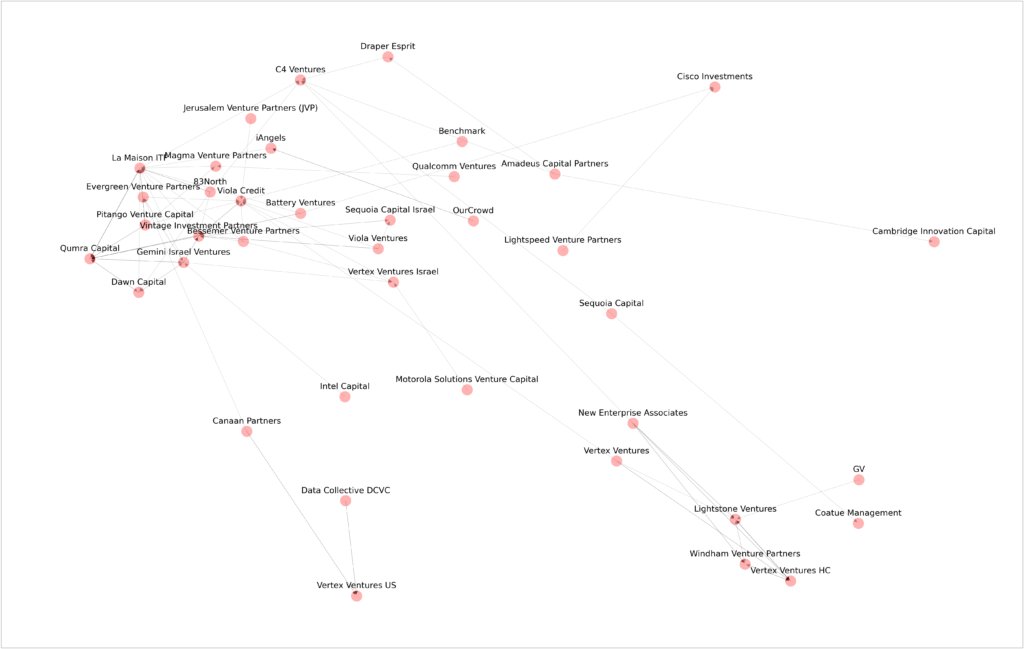
For example, the visualization shows that Vertex Ventures Israel invests after Viola Credit, which invests after Viola Ventures, which invests after Sequoia Capital Israel.
What’s next?
UN research identified the main principles of syndicates formation: geographical and based on industry interest. Cultural proximity also can be taken into account, as social media analysis confirms a possibility for the syndicate to be formed based on the same cultural narrative.
Future publications plan a detailed analysis of each syndicate in an attempt to determine the causes of the pooling of funds by analyzing the data in the UN database and examining open sources and online publications.

